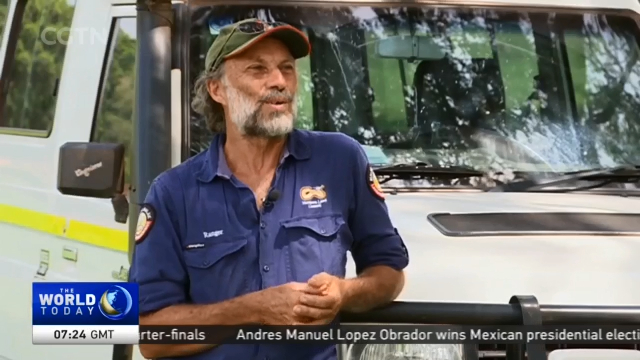
15:53, 02-Jul-2018
Australia's Indigenous Rangers: Ranger program helps conserve forests, support aboriginal people
Updated
14:53, 05-Jul-2018
03:05

In Australia, a growing group of conservation rangers are tasked with managing some of the most remote parts of the continent. The Indigenous Rangers Program is now more that a decade old. So far, it's proving to benefit conservation efforts nation-wide, and one of the most marginalised segments of Australia's population. Greg Navarro explains.
At the start of a tour for a group of Australian university students in Far North Queensland, some common sense tips and a brief history lesson about the Indigenous group that manages a huge swath of land here.
GREG NAVARRO TRINITY FOREST RESERVE "This reserve covers a massive area, nearly 1,000 hectares which include the bush, mountains, and the sea."
After a bumpy ride into a remote part of the Trinity Forest Reserve, Indigenous rangers begin the lesson. Since 2010, the Mandingalbay Yidinji Aboriginal people have been officially recognised for managing conservation efforts here through the Djunbunji Land and Sea Program.
DALE MUNDRABY EXECUTIVE DIRECTOR, DJUNBUNJI LAND AND SEA PROGRAM "For generations, our ancestors for thousands of years managed this country before contact and we continue to manage this country today using our cultural knowledge and to add value to that we use science."
It's part of a federally funded Indigenous rangers program now in its 11th year, designed to give Aboriginal groups the task of protecting and managing land around the country.
ROB LINDSAY MALAK MALAK RANGER COORDINATOR "Lots of people do aspire to be a ranger, because it's an important role."
This is how people from overseas often see Australia's Aboriginal population, through traditional ceremonies dating back centuries.
Within Australia, the oldest continuous culture on the planet is often viewed as a small but highly marginalised segment of the population, with higher rates of certain health issues, incarceration and unemployment than non-Aboriginal Australians. That's why the success and growth of these programs is so important.
VICTOR BULMER RANGER COORDINATOR "Our main aim is to get a lot of our mob, peel them off of the welfare cycle in a sense - try to get them work ready. Having this system set up, it actually gives our people a bit more hope in changing their wellbeing in the sense of becoming more diverse within the community itself."
Today, there are nearly 3,000 Indigenous rangers working across the country. Organisers say there are clear benefits to giving tour groups a glimpse of what they do.
DALE MUNDRABY EXECUTIVE DIRECTOR, DJUNBUNJI LAND AND SEA PROGRAM "Knocking down stereotypes, the walls about how Aboriginal people manage the country here in Australia and by showcasing that and interpreting that to visitors, they can better understand a appreciate the relationship we have as Aboriginal people to the country."
A relationship that draws from cultural knowledge, developed through watching over the land here for thousands of years. Greg Navarro, CGTN, Trinity Forest Reserve.

SITEMAP
Copyright © 2018 CGTN. Beijing ICP prepared NO.16065310-3
Copyright © 2018 CGTN. Beijing ICP prepared NO.16065310-3